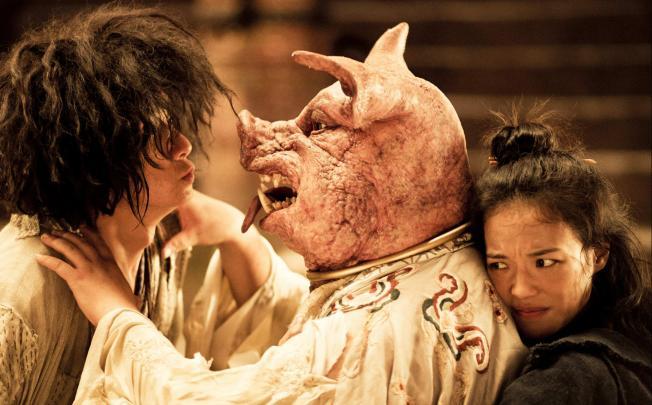JOURNEY TO THE WEST
Magnet
Reviewed for Shockya by Harvey Karten. Data-based on Rotten Tomatoes
Grade: B
Director: Stephen Chow
Screenplay: Stephen Chow
Cast: Qi Shu, Zhang Wen, Bo Huang, Show Luo, Shing-Cheung Lee, Bingqiang Chen, Sihan Cheng, Yu Xing, Zhengyu Lu,
Chi Ling Chiu
Screened at: Review 1, NYC, 2/11/14
Opens: March 7, 2014
Every country takes pride in its legends. The best known might be the Twelve Labors of Hercules, wherein the man had to slay a lion and a hydra, capture a Boar and a Cretan Bull, and, hardest of all, to steal a girdle. China is not about to sit back and let Greece take all the plaudits. The country with the most ambitious schemes of economic growth uses Stephen Chow to show that China, too, can match and maybe surpass Greece. The sixty-two year old Hong Kong director is known here in the West mainly for his “Shaolin Soccer” (a Shaolin follower unites with his brothers to use martial arts skills in forming a soccer team) and also for “Kung Fu Hustle” (residents of a housing complex use their extraordinary skills to resist a gangster). Never before, however, has Chow been graced with some of the most outrageous visual effects yet seen in the cinema. In other words, “Journey to the West” is pure cinema wherein plot take a long step back to make way for an abundance and variety of Fx. To what end? In “Journey,” a follower of Buddhism will gain full inauguration by Buddha himself if he can save the people from a number of dragons; specifically, a big fish or piranha, a monkey god, a gorilla, and a huge, ugly pig.
With an abundance of comic violence involving a Miss Duan (Qi Shu) who uses a series of large rings to pulverize her enemies, Chow has his characters take off in a series of actions that are truly cinematic—that is, this movie is not meant to be seen on an I-Pad but needs the full resources of the big screen to give graphic life to the classic novel Journey to the West, which, by the way, is available on Amazon.com in a boxed set of four novels dealing with the search for the Buddhist Sutra, i.e. the sermons of the historical Buddha.
Audience members will have their favorite segments of this drama; mine is the very first, a comical look in which a community living in shacks on a river are threatened by a big fish that can leap to the top of the hill to drag down anything and anyone that moves. The principal demon-hunter, Wen Zhang, heretofore seen in “Love is Not Blind,” is not an overly ebullient hero but a quiet fellow with a big mop of hair which, as we find out later, he would give up, every follicle stripped from his head, to become an early representation of the Buddha. Though he comes across like a fifth-degree black belt, he is political to the left, believing that there is goodness in the most evil human being. He therefore seeks to use his charm to evoke the good qualities that he believes are buried in the most corrupt form of life.
In the struggle he is aided by Miss Duan (Shu Qi), who has fallen in love with her fellow demon-hunter but who, we expect, will be snubbed as Xuan Zang who seeks a love that is higher than that which we associate with romance—a Platonic idea, perhaps. He is to learn that there is really not a ladder of quality: that human love is the equal of the most glorious heavenly kind.
The film has hardly a focused plot, unfolding as a series of Herculean, or Buddhist, tasks, some of which are comical, others simply an exercise in technical proficiency. Ultimately the pulverizing, the bombing, and the knifings become repetitious, but we cannot fault the actors who, like the thespians of an early time in cinema history when silents were king show their emotions largely by widening their eyes.
Rated PG-13. 110 minutes. © 2014 by Harvey Karten, Member, New York Film Critics Online
Story – C
Acting – B
Technical – A
Overall – B

